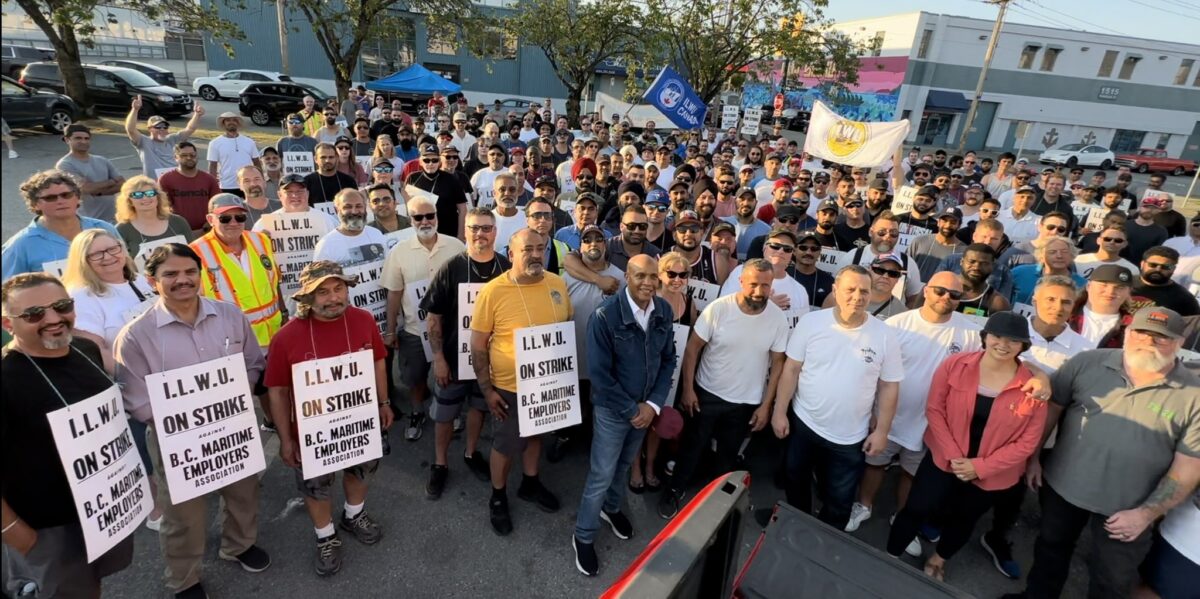As the B.C. port workers strike presses into its fifth day on Wednesday, July 5, the pressure for the parties to reach a collective agreement is mounting as the risks to the economy dominate the media’s discussion of this workers’ struggle.
The International Longshore and Warehouse Union Canada (ILWU), representing more than 7,000 port workers at 30 ports across B.C. began strike action on Saturday, July 1 after being unable to reach a collective agreement with the British Columbia Maritime Employers Association (BCMEA).
While the risk to the Canadian economy is very real, as a large amount of Canada’s imports and exports pass through B.C. ports, the hyperfocus on the economic effects of the strike takes attention away from the concerns that the ILWU is raising.
“We hope the BCMEA is not using its vast resources and connections to vilify the Union and scare the public with tales of economic disaster,” wrote ILWU president Rob Ashton in a bargaining update on the union’s website.
The battle for public opinion
ILWU Canada Secretary and Treasurer, Bob Dhaliwal, said that it is not uncommon for unions to have to deal with this type of vilification.
“Companies are always trying to create fear and misinformation to move public opinion against unions,” Dhaliwal wrote in an email to rabble.ca.
The BCMEA released a statement saying that the ongoing strike is immediately impacting Canadians and businesses. However, this strike is not without support. ILWU Canada made a post sharing messages of solidarity from across the world.
Taylor Brachach, the Member of Parliament for the riding of Skeena-Bulkley Valley, was one of the people who extended his support to the strike. Brachach wrote to federal ministers of labour and transportation urging that they help the parties reach an “equitable” deal.
“The issues the ILWU has raised are important ones and given the state of Canada’s supply chain, the stakes are very high,” Brachach said in a press release.
Brachach said that Minister of Labour Seamus O’Reagan’s decision to stay in Vancouver despite talks stalling is encouraging. However, the risk of back-to-work legislation still looms.
Some people such as Alberta Minister of Transportation and Economic Corridors, Devin Dreeshan, support the idea of using back to work legislation. Dreeshan was quoted in a Calgary Herald opinion piece saying that the federal government should “use legislation if necessary” during this strike. Dreeshan reiterated this sentiment in a tweet.
While a prolonged strike can harm the economy, forcing a collective agreement can harm workers rights.
“We’ve seen successive liberal and conservative governments utilize back-to-work legislation far too frequently. The message that sends to employers is that if they hold out long enough, the government is going to rescue them. And that undermines the very essence of the collective bargaining process,” Brachach said.
“When workers are able to secure gains through collective bargaining that ripples out through the rest of our society, it lifts everybody up… The right to collectively bargain and take labour action is a right that is not only protected by our Constitution, but has resulted in generations of middle class Canadians, improving their standard of living.” Brachach added.
Why oppose contracting out?
One of the major concerns that the union has raised is the contracting out of maintenance jobs. The BCMEA has said that contracting out is necessary because the ILWU has been unable to fulfill the trades work that they have jurisdiction over. The ILWU has said that this is not true.
“It is an unwillingness of the employers to properly utilize our trades workers. We already have sufficient numbers of registered trades workers to meet the demands of the industry and we continue to recruit more. The issue is that the BCMEA member employers refuse to utilize them or train them as required,” President Rob Ashton wrote in a press release.
Contracting out of jobs often contributes to deteriorating labour conditions. In November, custodial workers at the University of Toronto were fighting the contracting out of their jobs. According to their union, workers employed by third party contractors made about 26 per cent less per hour than union workers. Third party contract workers also were denied access to employee benefits.
READ MORE: Canadian universities’ staff battle ‘culture of entitlement’
While the details of labour conditions for B.C. port workers employed through third party contractors are not widely available, these workers would not be protected by any collective agreement reached and would be left vulnerable.
“None of this takes away from the fact that the supply chain is in a fragile state and there are a lot of aspects of our country that are affected during challenging times like this,” said Taylor Brachach. “But solidarity is about seeing the welfare of our neighbors as connected to our own welfare.”



